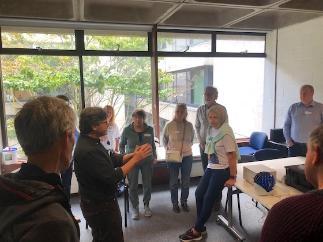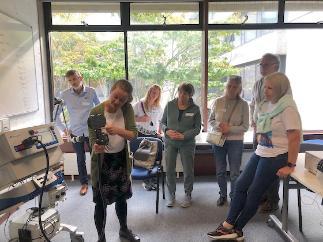Dance and the brain: PPI event opens School of Psychology laboratories to people with Parkinson’s
Late last year, neuroscience researchers in the School of Psychology welcomed a group of people with Parkinson’s to the Aidan P. Moran Research Laboratories as part of the national PPI (public and patient involvement) Festival.

The aim of the event was to share information about research into dance and movement strategies in Parkinson’s, and to illustrate different ways in which people with Parkinson’s can be involved in shaping research.
The event was organized by (opens in a new window)Dr Jude Bek, MSCA DOROTHY Fellow. Dr Bek’s international fellowship, based at UCD (working with Associate Professor Nuala Brady) and the University of Toronto (with Professor Tim Welsh), will investigate strategies to help with movement for people with Parkinson’s.
Following a research presentation and Q&A, visitors were given a demonstration of some of the technologies used in the lab to study the brain and movement. This included non-invasive brain stimulation, which can temporarily modulate areas of the brain to influence performance or learning, and motion capture to record people’s movements precisely during a task. These techniques will be used in Dr Bek’s research to try to understand the effects of dance and other strategies that can activate movement centres in the brain.
Finally, visitors had a chance to get to know each other over coffee and share their experiences of research, dance, and living with Parkinson’s.

Feedback indicated that people felt more confident about being involved in research, and that their outlook on PPI had changed, following the event. Some also noted learning about what goes on behind the scenes in neuroscience research, such as “the highly technical nature of measuring results”.
It was also a learning experience for the researchers who attended. Jessica (recent MSc graduate) commented, “It’s great to see the people affected by the research actively being involved in developing it to appeal to their own needs. I think researchers should start viewing people affected as experts in the area.”
Dr Patricia Gough noted “the curiosity, enthusiasm, and willingness to share experiences of living with PD, were a reminder of how valuable these events can be for everyone involved", while Professor Klaus Kessler reflected on “how knowledgeable the attendants diagnosed with Parkinson’s already were. I was amazed by the level of discussion in the room”.
The importance of involving people with Parkinson’s in research was further highlighted by one of the visitors: “Being there, listening to the well-researched presentation and seeing the laboratories and the equipment gives me great hope for the future”.
We hope this will be a starting point for building lasting partnerships between UCD and the local Parkinson’s community, as well as hosting further events for other groups.
For more information about the research or PPI activities, please contact (opens in a new window)judith.bek@ucd.ie.